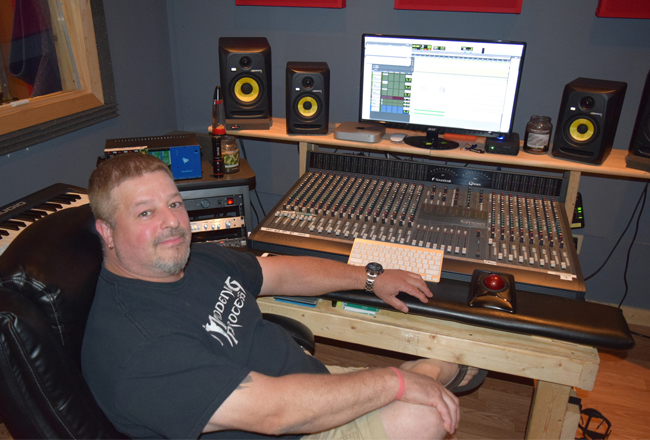Brookfield’s Hat City keeps a lid on musicians’ recording costs
Christopher Litwin first stepped into a recording studio in 2005 when his then-band, Father Panic Riot Orchestra, was ready to produce its first album.
“It cost us $5,000 ”“ $1,000 a day for five days,” he recalled, adding that the finished album did not achieve his dream of music perfection. “We rushed to get it done because of the cost.”

A guitarist in several bands in Connecticut”™s indie music scene during the 1990s and early 2000s, Litwin recognized that performers faced limited and often expensive options when recording their music in the state. While his initial foray into the studio was “a great experience,” he said, he believed that he could create a recording environment that would produce audio magic without draining the performers”™ wallets.
Fast-forward 10 years and Litwin”™s Hat City Music Productions, which opened in December 2015 at 536 Federal Road in Brookfield, works with a variety of Connecticut performers from different music genres, ranging from the heavy metal thundering of I Within I to the intricate wordplay of rapper Anthony Skillz to the theatrical pop compositions of singer-songwriter Dayton Fenwick. But getting his company set up was a decade-long learning experience for Litwin.
“I started it in my basement in 2005,” he said. “I”™ve been playing guitar for over 35 years, but I wanted to get out of it and start recording bands. I was always fascinated how music was created.”
He began experimenting with his own music, but quickly learned that do-it-yourself was not the same as do-it-correctly, and he went back to school to study music engineering. He earned degrees from the Institute of Audio Research and the Recording Radio Film Connection. The latter school linked him in a mentorship with Grammy-winning producer Edwin Ramos, whom Litwin credited with pointing out the complexities of the technical and human aspects of the recording experience.
“You can read a book all day, but if you are not interacting with all of the various parts of the process, you”™re not learning everything,” Litwin said.
Litwin then returned to his home studio and in 2010 recorded an album for the band Sourpuss. But he realized that his home was not the ideal location for such work, even with home moving pads blanketing the walls to spare the neighbors from
his noisy business.
Litwin, who holds a day job as a senior mechanic for the town of Wilton, began saving for a standalone studio and eventually amassed the funds to create a state-of-the-art facility. “I have well over $15,000 in equipment in here,” he said. “And I probably have at least $25,000 in software and plug-in files.”
From his own connections in the local music scene and recommendations from friends and postings on websites including Alignable and Soundbetter, Litwin quickly grew a roster of clients. Keeping to his initial promise of cost-effectiveness, he set a price scheme that fits a struggling musician”™s budget.
“Depending on the session, I usually charge $40 an hour,” he said. “A five-song demo with mix-master can go out the door at about $1,500. And that”™s not a lot of money ”” engineer studios in New York City can charge $100 to $300 an hour.”
One band now in the studio with Litwin is Super Glue, a teen group from Newtown. “They got a quote to go to another studio and were going to spend $3,000,” Litwin said. “I told them, ”˜I don”™t think it is necessary for you to spend $3,000 on your first three-song EP.”™”
Litwin is no stranger to dealing with the diva personalities, the legends in their own minds, who are part of the music industry. “You try not to hurt their ego or their integrity as a musician,” he said. “If there is a problem, I try to word it in a way that they understand ”” I don”™t want my comments to be detrimental to them. When I have to, I try to encourage them to do another take if the first one doesn”™t go right.”
Litwin is working to expand his business beyond music recording. He has already produced e-holiday cards for a client and is exploring podcasting projects. And while he admitted to sometimes getting depressed when business grows slowly, Litwin quickly calls up a conversation he had earlier this summer with Grammy-winning engineer
Richard Chycki as encouragement to press ahead.
“He told me: ”˜If you do a great job, they”™ll find you”™. It could be a slow start, but if you put good product out there ”” that one good album ”” they”™ll find you.”